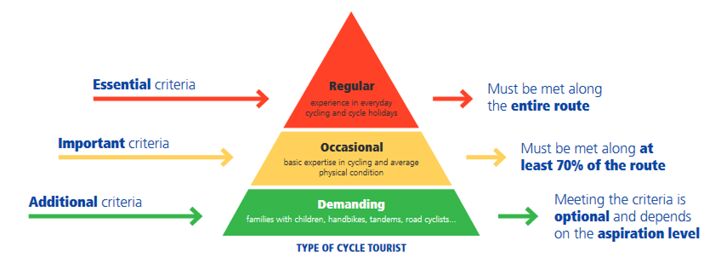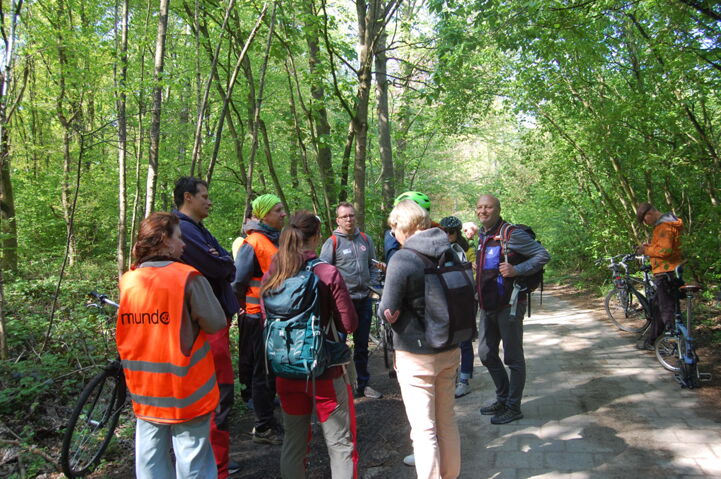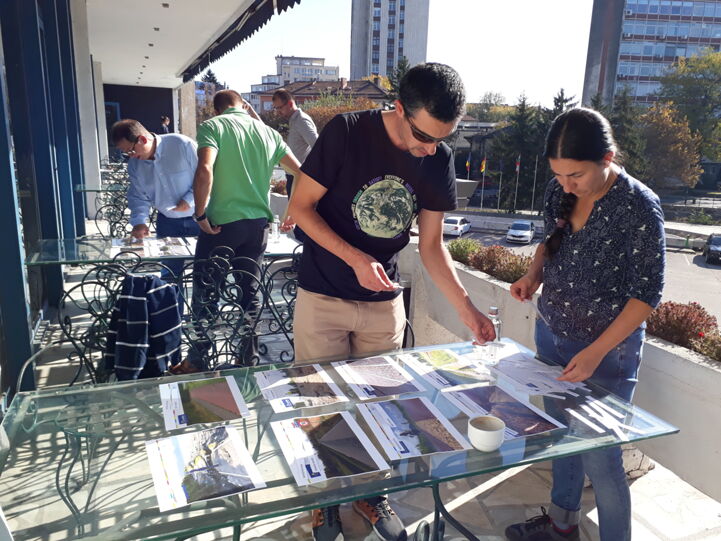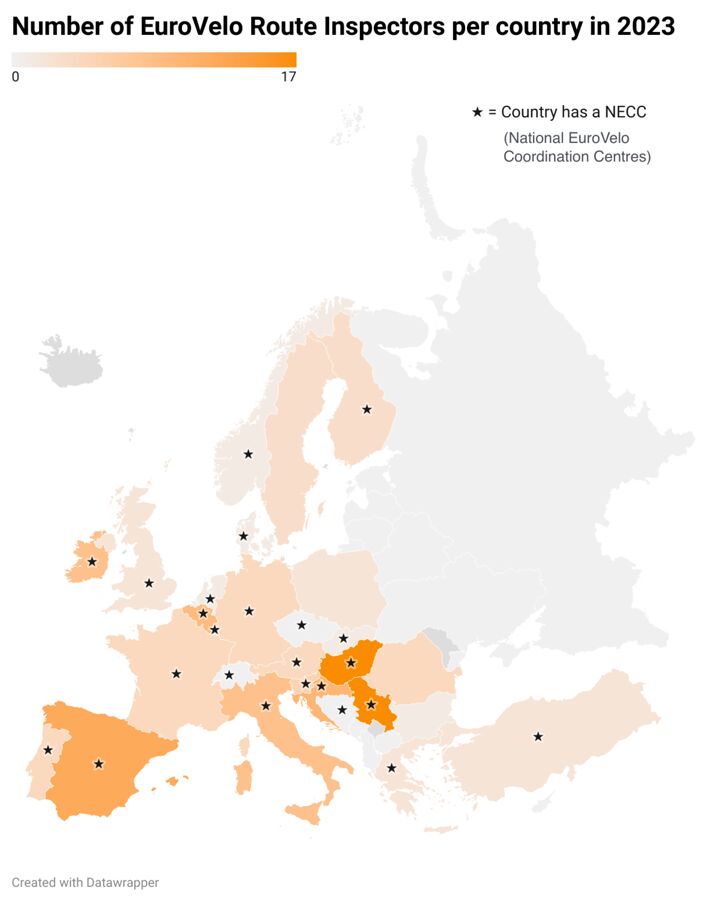What is ECS and why become a EuroVelo Route Inspector?
A bit of history...
The first-ever Handbook for EuroVelo Route Inspectors was published in September 2014, in the frame of the DEMARRAGE project. It already contained the main elements of the European Certification Standard (ECS): quality criteria relating to infrastructure, services and communication. The criteria are assessed differently whether they aim to answer the needs of regular, occasional or demanding long-distance cycle route users.

The ECS methodology has been improved continuously over the years and underwent two major updates in 2017 and 2021. The second one included an update of the ECS app, which allows to collect survey data in the field, making it more intuitive and user-friendly. Further improvements are planned in the coming years, including more guidelines on data analysis and practical case studies.
A growing interest in the ECS methodology
Almost ten years later, we can see that the interest in ECS is growing among our partners across Europe. ECS surveys started exclusively in the framework of European projects – this is how major sections of EuroVelo 1 – Atlantic Coast Route, EuroVelo 5 – Via Romea (Francigena), EuroVelo 6 – Atlantic-Black Sea, EuroVelo 8 – Mediterranean Route, EuroVelo 10 – Baltic Sea Cycle Route and of course EuroVelo 15 – Rhine Cycle Route were surveyed between 2014 and 2019.
In the last few years though, following the update of the methodology and app, ECS surveys started to take place outside of European projects. There are initiatives in Austria and Croatia to survey EuroVelo routes, and we encourage more NECCs and external stakeholders to get in touch with us for using the ECS methodology.
Why should you take part in the EuroVelo Route Inspectors' training?

The only way to use ECS methodology is to take part in the EuroVelo Route Inspectors’ training that has delivered 200 EuroVelo Route Inspector Certificates since 2015. Every year, ECF organises at least one EuroVelo Route Inspectors’ training during two days, which includes lectures, exchanges, individual and group exercises, as well as a field trip to learn how to use the ECS app on the ground. Participants learn all about ECS and how to apply it to assess the quality of long-distance cycle routes, identify their weaknesses and plan future developments. If they are successful in the test, they become EuroVelo Route Inspectors and can be added to the List of Official Inspectors. The EuroVelo Route Inspectors' training 2024 will take place in Brussels.
Hereafter is a list of a few things the EuroVelo Route Inspectors' training will help you with. If some of these would be useful to you, in your work or for personal learning, you should probably consider registering to next year's training!

- Additional knowledge about cycling infrastructure, services and promotion and what a high-quality cycle route is made of. The EuroVelo Route Inspectors' training starts from basics, so everyone is welcome to expand their knowledge on the ecosystem of cycle routes. Note that the ECS methodology may also be applied at the planning stage of developing a long-distance cycle route or cycle route network.
- A ready-to-use solution and tool to gather precise data on cycle routes to back-up demands for more and better infrastructure, cycling-friendly services and communication materials.
- A methodology to assess what is needed for a quality cycle route to meet the needs of cyclists of specific target groups and estimate the improvements and investments required to meet the quality expectations. Field surveys allow to gather precise GIS data and build a strong case for the investments needed, as you will be able to pinpoint and describe the issues with great accuracy.
- Acquiring knowledge on how to analyse survey data collected with the ECS app, to check if a EuroVelo route meets the specific set of quality criteria required for the EuroVelo Certification label. “Certified route” is the highest quality level on the EuroVelo network.
Join us for a training session in 2024
All this knowledge is only a few clicks away from you! Join us in Brussels on 9 and 10 April 2024 by registering here to the EuroVelo Route Inspectors’ training (registrations will close on 15 March). This session is limited to 35 participants to ensure interactive training where everyone has the opportunity to ask questions and get personalised feedback.
- “Very easy to follow-up, even if previous knowledge is limited. Exercises were very helpful and made the day easier. Field trip and feedback have been enlightening to complete my understanding of the ECS logic. I enjoyed it a lot!” - Feedback from a participant in the EuroVelo Route Inspectors’ training 2023.
If you took part in a EuroVelo Route Inspectors’ training course prior to 2020, register here to the Refresher Course taking place online on 7 February 2024 (registrations will close on 19 January) and make sure to stay on the list of Official EuroVelo Route Inspectors along +110 others spread across 27 countries. Help us filling the gaps of countries where no EuroVelo Route Inspectors is available yet by checking the map below!
